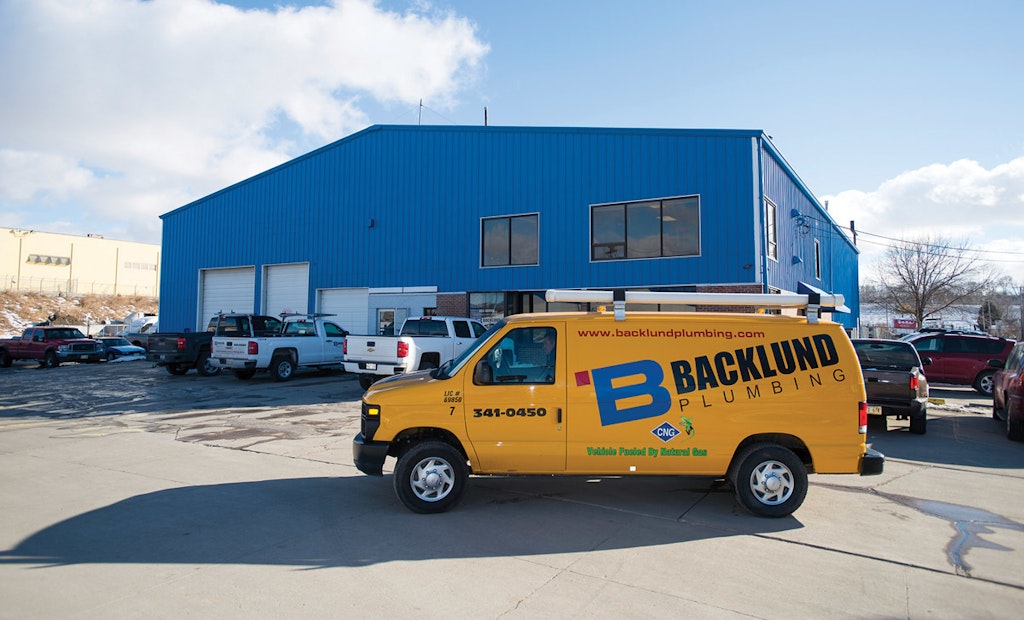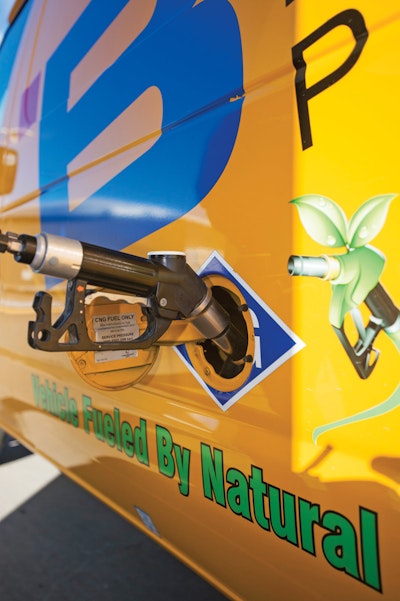
Backlund Plumbing uses approximately five Ford Transits with a bi-fuel option of CNG or gasoline, 10 Ford E-250 Econoline vans, two Freightliner pump trucks, three Freightliner service body trucks and a Peterbilt crane truck that all operate with dedicated CNG motors.
Interested in Trucks?
Get Trucks articles, news and videos right in your inbox! Sign up now.
Trucks + Get AlertsIf you’re considering taking your business on an eco-friendly path, your vehicle fleet is a good place to start.
Embracing fuel-efficient drain cleaning and plumbing standards is great for your brand name by showing existing and potential new customers that you value sustainable work practices. But it not only can boost your brand, it can also be great for your bottom line and lead to increased productivity.
Technological advancements have provided amazing opportunities to progress the industry. Compressed natural gas vehicles are now commonly seen cruising the highways and deliver a chance to embrace technological change for the advancement of your business.
About five years ago Chris Roseland, owner of Backlund Plumbing, saw the high fuel prices, decided it was time for a change and purchased the companies first fleet of CNG service vans. Since then, his fleet has grown considerably. Backlund Plumbing now utilizes approximately five Ford Transits with a bi-fuel option of CNG or gasoline, 10 Ford E-250 Econoline vans, two Freightliner pump trucks, three Freightliner service body trucks and a Peterbilt crane truck that all operate with dedicated CNG motors.
“Immediately, the first two years we were saving well over $1 per gallon,” Roseland says. “I feel like in the first two years we probably paid off most of the investment.” According to Ford, the equipment and conversion cost from gasoline to CNG will run owners approximately $7,500 to $9,500, depending on options selected.
Other manufactures like Chevrolet’s Express vans and Chrysler’s Ram 2500 heavy-duty pickups are also able to convert to CNG so an existing fleet can be used without starting completely over.
Roseland also says that teaming up with local utility gas companies is something to look into to help cover the expense of converting. “The initial rebates were probably the biggest help for us to get it done,” he says. “It was close to a 50% match on the conversion of the vehicle. Along with a very low interest loan from our state agency for air quality.”
Refueling considerations
“Down the road I am way more interested in converting our larger trucks versus our everyday service vehicles,” Roseland says. His reasoning behind that comes down to miles per gallon. “Those smaller vehicles are already getting 20-25 miles per gallon.”
The larger municipal trucks for utility work that only get 3-4 mpg can become quite expensive to run when going through 50 gallons a day or more, especially when the cost of fuel is high.
One important consideration before CNG conversion is refueling options. Backlund Plumbing is located in Omaha, Nebraska, and fortunately, their plumbing shop is centrally positioned between two of 12 large natural-gas filling stations across the city. For them, this makes filling trucks as easy as driving to a conventional gas station, but depending where your business is located, it may not be so simple. Some companies that rely heavily on CNG vehicles have made the investment to install their own filling stations to ensure fuel supply at their facility.
With that in mind, even if you are located near a filling station or have one at your shop, it’s smart practice to make sure the tank is full before leaving for the day. “Sometimes we have to fill up to go somewhere far to make sure we are able to get back. You can’t just go fill up wherever you want,” Roseland says.
Other green options
Roseland adds that he is definitely interested in looking into electric vehicles in the future as more options become available.
Precision Plumbing, Heating, Cooling and Electric, in Boulder, Colorado, is currently relying on electric power to propel its service truck. The electric vehicle they purchased in 2012 was Boulder Electric Vehicle’s first order made in an effort to do their part in energy conservation.
Ford also has plans to reveal a brand-new E-Transit in 2022 offering the first all-electric cargo van from a full-line automaker in the U.S. The E-Transit will be available in chassis cab, cutaway and cargo van models and come in three length choices and roof heights giving contractors yet another option for a green initiative.
Eco-friendly trucks and vans can even increase efficiency on the road in many areas. Certain states allow hybrid and electric vehicles to travel in the high-occupancy vehicle lane, so drivers have less chance of getting stuck in traffic.
Don’t forget one of the biggest gains of going green with your fleet: the publicity. Turning over a new eco-friendly leaf is a great marketing tool for your business.
“The customer response was great once you educated them. Once we lettered our vehicles with CNG and they found out our vehicles only run on natural gas, it was like icing on the cake for us,” Roseland says. “When you do everything right plus you show up in a green vehicle, you’re their go-to.”
Environmentally friendly vehicles are definitely something to consider when shopping for a new fleet or single service truck. Not only are they a clean means of transportation, but they can also lower fuel costs and boost your brand name.






